A few major hotel groups dominate the global hotel industry, each commanding a significant market share. This article will explore the competitive landscape of the world’s largest hospitality players. We’ll examine the expansion strategies they use and the brands they operate and compare them across key metrics. Let’s dive in.
What are hotel groups, hotel chains, and hotel brands?
A hotel group is a global hospitality enterprise that consolidates a vast portfolio of diverse companies spanning a large number of properties. For example, Marriott International, one of the world’s largest hotel groups, owns over 30 hotel chains, ranging from luxury options like The Ritz-Carlton to more budget-friendly choices like Fairfield Inn.
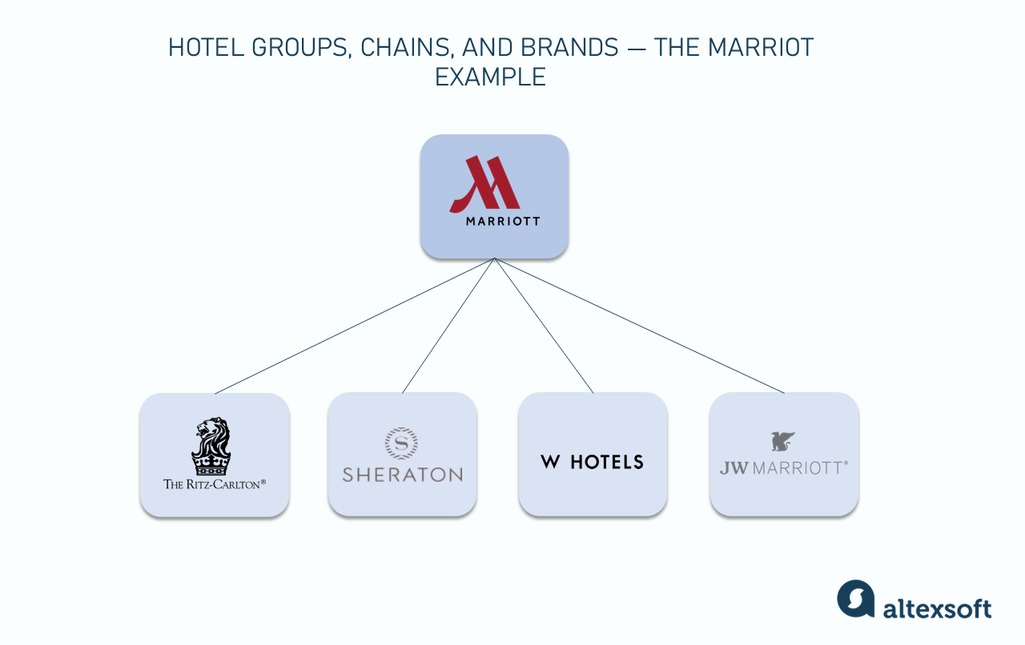
Hotel groups, chains, and brands — the Marriott example
A hotel chain is a collection of four or more hotels bearing the same name, adhering to the same rules and standards, and controlled by the same parent company. Depending on their target audiences — luxury travelers, workationers, business travelers, families, and more — hotel chains fall into several major categories.
- Full-service chains offer numerous amenities, including on-site dining, room service, and meeting spaces.
- Select-service chains provide a more focused range of amenities, balancing comfort and convenience.
- Boutique chains emphasize unique, personalized experiences with stylish decor and intimate settings.
- Resort chains are vacation-oriented, offering extensive recreational activities in popular destinations.
- Extended-stay chains cater to guests needing long-term accommodations, featuring kitchenettes and living areas.
- Luxury chains provide top-tier service and amenities, often in prime locations.
- Economy chains focus on budget-conscious travelers, providing basic accommodations at lower prices.
A major selling point of hotel chains is the consistent experience and sense of familiarity they offer across properties and locations—something known as a hotel brand. In other words, a brand is the unique identity of the hotel chain, which includes its name, logo, and expected level of services. So, in this article, we will use the terms “chain” and “brand” as synonyms.
Types of hotel ownership
A hotel group doesn’t necessarily directly own all properties coming under its umbrella. Instead, they leverage different agreements that allow for the quick expansion of associated brands. Let’s look into the main forms of arrangements groups use.
Full ownership
A hotel group owns and operates the entire hotel, including the land, building, and all related assets. This model gives them complete authority and control over every aspect of the hotel, from daily operations to branding and long-term strategic decisions.
It’s not all upsides, however, as full ownership comes with risks and responsibilities. The group bears the full financial burden, including operational costs, ongoing housekeeping and maintenance, marketing, staffing, and future renovations.
Hotel franchising
99 percent of US hotels are franchised, meaning that local hoteliers operate their business under the large brand’s name. In this model, a hotel owner (the franchisee) pays a hotel group (the franchisor) an initial application fee and a percentage of sales for the right to use the group’s logo, business strategy, marketing power, IT systems, customer reach, loyalty programs, and operational support.
The franchisee is responsible for managing the hotel’s operations and must follow strict guidelines as part of the agreement.
By licensing their brands to independent owners, the hotel groups increase their geographic footprint and market share without making heavy investments in real estate, new staff, or daily operations.
Management contracts
Under the hotel management agreement, a hotel group operates a specific hotel on behalf of its owner in exchange for a fee. The hotel owner is responsible for property maintenance while the hotel group takes on all day-to-day business operations, establishes quality control, and provides brand recognition. This scenario is a good fit for property owners who want their hotels managed by a well-established brand. It is the predominant ownership model in Asia, with 80 percent of its hotel sector operating on management contracts.
Leasing
A hotel group can lease a property from an owner (the lessor) for a fixed period, usually 10 to 20 years, during which they have full control over the hotel's operations. The hotel group pays the lessor a regular payment — a fixed amount or a percentage of the hotel’s revenue.
Top global hotel groups overview
The global hospitality sector is dominated by several hotel groups, with no single leader across all parameters. Some win by the number of properties, while others prevail in brand diversity. However, at the time of writing this article, Marriott International distinctly towered over its competitors and could be considered the world's largest hotel group by at least two factors — market cap ($63 billion) and annual revenue ($6.439 billion).
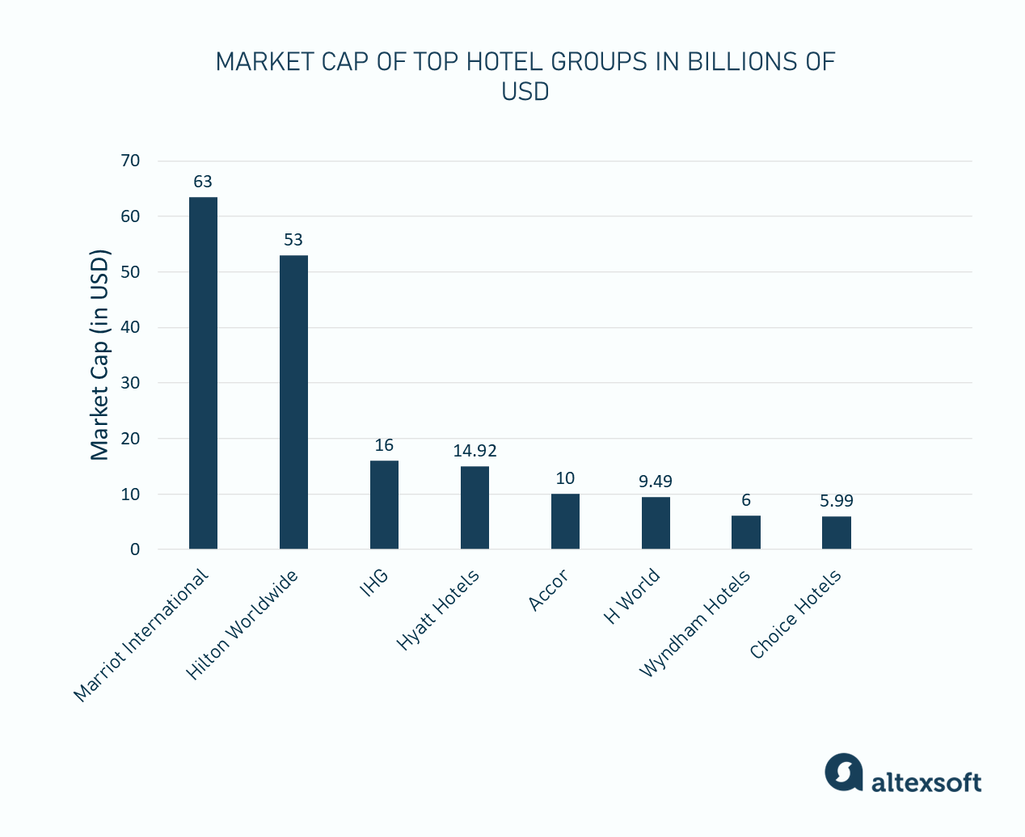
The market cap of top hotel groups in billions of USD. Source: Stock Analysis
Marriott also operates the largest number of guest rooms — 1.6 million. This massive footprint results from strategic acquisitions and organic growth, including the notable purchase of Starwood Hotels & Resorts in 2016, which significantly boosted its room count.
The runner-up in terms of market cap is Hilton Worldwide, with a dollar value of 53 billion. Other rivals are significantly behind — Intercontinental Hotels Group (IHG), the third leader, hits only 16 billion.
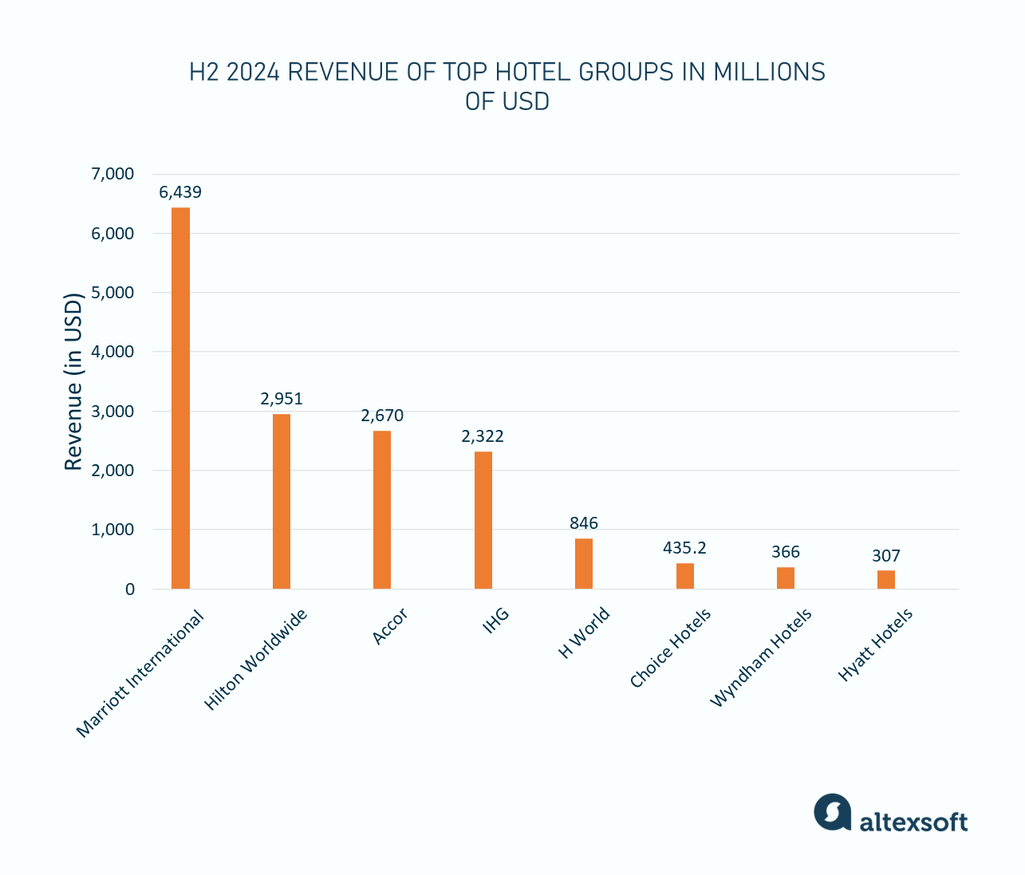
H2 2024 revenue of top hotel group in millions of USD. Source: Stock Analysis
As for revenue, Hilton Worldwide also ranks second after Marriott, but its results are more than twice as low (approximately $2.9 billion). The next in a row is Accor ($2.6 billion), which, at the same time, boasts the most extensive brand portfolio. With 55 brands under its belt, it caters to a wide range of customers, ensuring its resilience and adaptability in various markets.
Regarding the number of properties, H World Group takes the lead, operating over 10,000 properties worldwide. In contrast, Marriott has 9,000 properties.
Below, we’ll examine nine leading hotel groups that were selected based on several factors, such as market cap, revenue, notoriety, and the number of brands and properties they have.
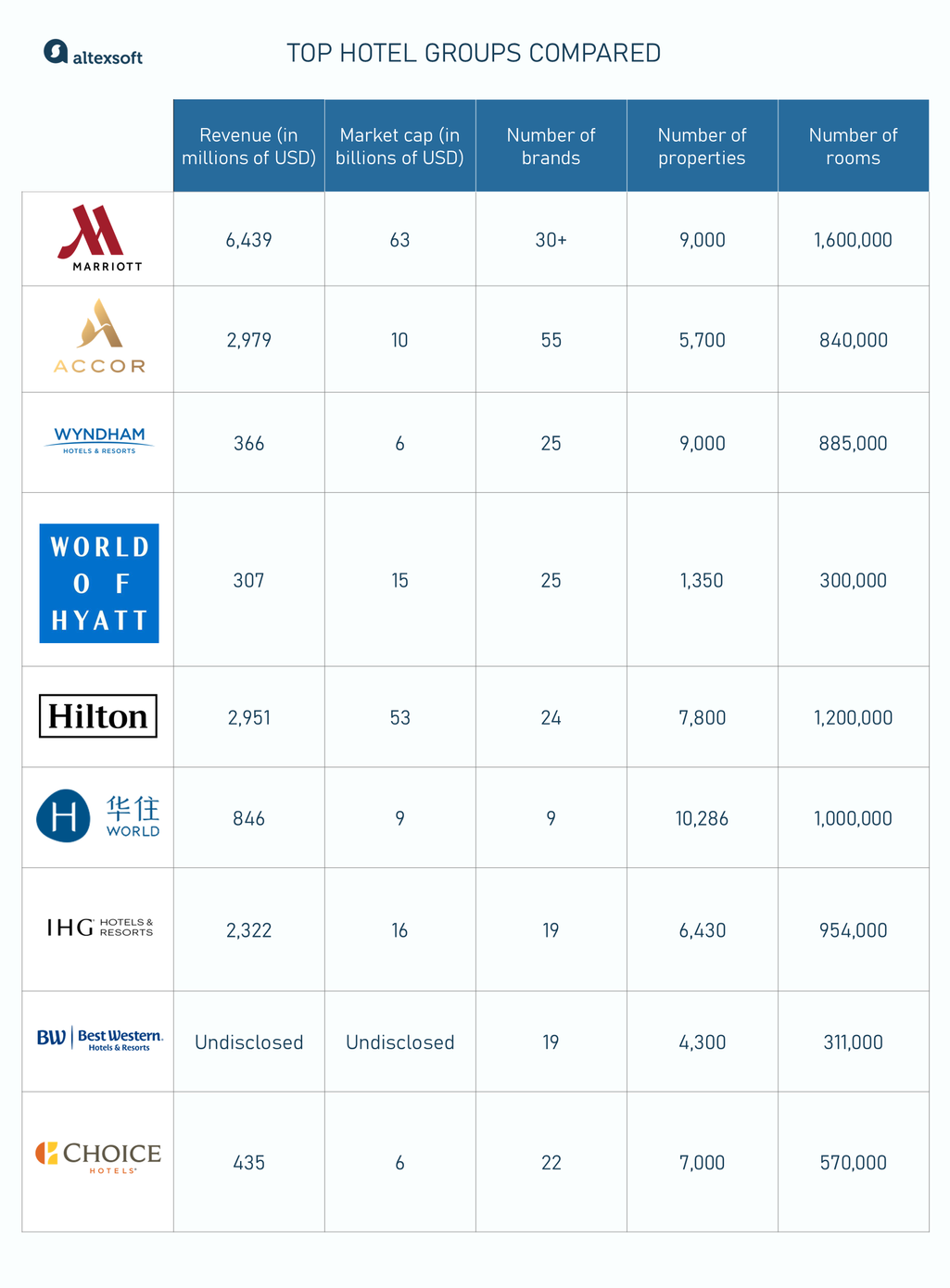
Top hotel groups compared
Marriott International
Marriott International was founded in 1927 by J. Willard and Alice Marriott. It started as a root beer stand in Washington, DC, expanded to a chain of restaurants, and eventually pivoted even to airline catering. They opened their first hotel in 1957, laying the foundation for the hospitality giant we know today.
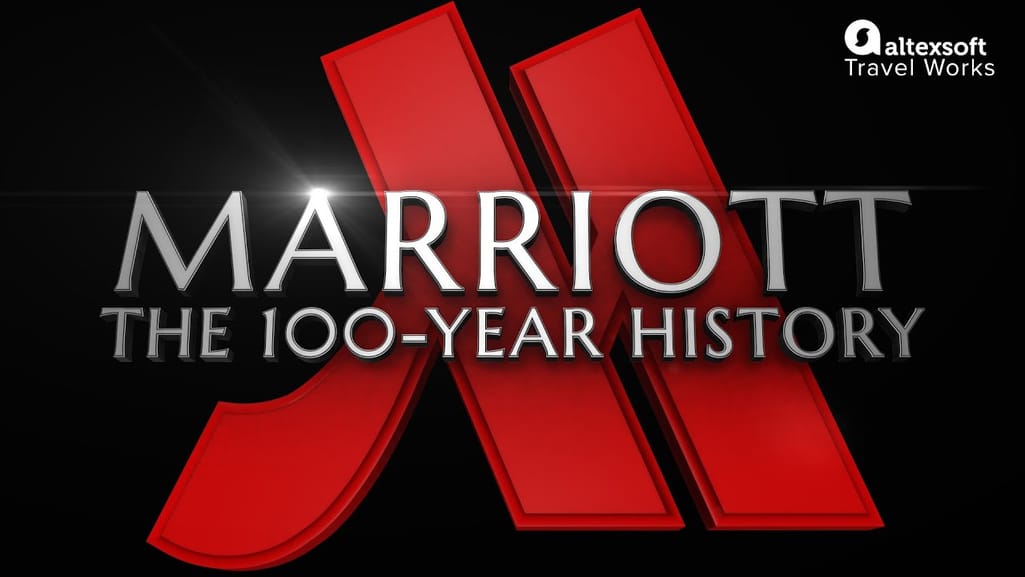

From root beer stand to hotel empire — the history of Marriott International
Brands. Marriott International has 30+ hotel brands in its portfolio, including notable ones like The Ritz-Carlton, Fairfield Inn, JW Marriott, and Sheraton. Marriott’s brands fall into five categories — luxury, premium, select, longer stays, and collections, all catering to different customer segments.
Properties and rooms. Marriott operates nearly 9,000 properties with approximately 1.6 million rooms across more than 141 countries. Its expansive portfolio makes it the largest hotel group to date. Over 6,000 of Marriott’s hotels are franchised, and its largest market is North America, which holds about 6,000 of its properties, with only 799 located in Europe.
Revenue. In the second quarter of 2024, Marriott International reported a total revenue of $6.439 billion, representing a 6 percent increase compared to the period in 2023.
Loyalty program. Marriott Bonvoy was launched in 2019, following the merger of Marriott Rewards, Starwood Preferred Guest (SPG), and The Ritz-Carlton Rewards programs. With more than 210 million members, Bonvoy is the largest loyalty program in the hospitality sector.
Accor
Founded in 1967 in France, Accor has grown to become one of the most diversified hospitality companies in the world. It offers a comprehensive ecosystem that includes hotels, restaurants, bars, coworking spaces, and more.
Brands. Accor has 55 brands and has expanded its portfolio through strategic acquisitions. Its brands cover five categories: luxury brands like Fairmont and Sofitel, lifestyle hotels like Hyde, premium brands like Grand Mercure, midscale hotels like Adagio, and economy brands like Ibis (budget and styles). When it comes to luxury brands, Accor works with hotel owners on a managed model, while they primarily operate through franchising for midscale and economy brands.
Properties and rooms. Accor operates 5,700 hotels and 840 thousand rooms worldwide. The company is present in 110+ countries, but 30 countries make up 90 percent of its business. Currently, most of its rooms—37 percent—are in North Africa and Europe,
Revenue. As of the first half of 2024, Accor reported revenue of $2.677 billion, an 11 percent increase from 2023. This growth was primarily driven by a 22 percent rise in its luxury and lifestyle segments.
Loyalty program. Accor’s loyalty program, tagged “ALL: Accor Live Limitless,” was launched in 2019. It has five status tiers that provide benefits like room upgrades, access to activities like art exhibitions and cruises, and spa rewards.
Accor APIs. Accor’s API portfolio provides several APIs. These include APIs for:
- Retrieving information about accommodations on Accor properties,
- Accessing availability information for booking operations,
- Integrating your hotel POS system with Accor’s food and beverage hub, and
- Initiating online payments, cancellations, and refunds.
Accor’s APIs are free to use, and to get started, you only need to create a development account.
Wyndham Hotels & Resorts
Wyndham Hotels & Resorts is one of the world's largest hotel franchising companies. Founded in 1981 in Dallas, Texas, it has grown through a series of acquisitions and mergers to become a major player in the hospitality industry.
Brands. Wyndham has 25 brands spread across six categories:
- distinctive like Wyndham Grand,
- upscale like Wyndham Hotels & Resorts,
- lifestyle like Wyndham Alltra,
- midscale like La Quinta,
- economy hotels like Super 8, and
- properties for extended stays like Hawthorn Extended Stay.
Not all brands with "Wyndham" in their name are operated by Wyndham Hotels & Resorts. Instead, some of them, particularly those related to timeshares, are managed by a different company called Travel + Leisure through its Wyndham Destinations unit.
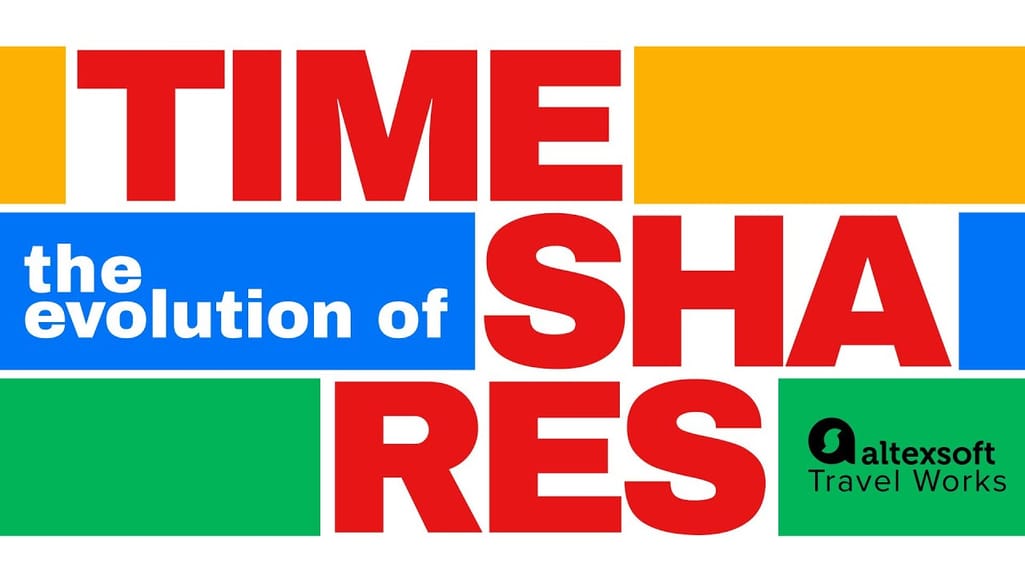

Properties and rooms. Wyndham has over 9,000 properties and 885,000 rooms, with operations across 95 countries.
Revenue. Wyndham’s 2024 second-quarter report states that the company generated $366 million in revenue.
Loyalty program. Wyndham Rewards has about 101 million registered members. There’s also Wyndham Reward Business, which stimulates companies for business travel.
Hyatt Hotels Corporation
Hyatt Hotel Corporation is an American multinational hospitality company headquartered in Chicago, Illinois. It was founded by Jay Pritzker in 1957 and has grown from a motel into a global group through organic expansion and strategic acquisitions.
Brands. Hyatt has 25 brands spanning luxury, upper-upscale, and upscale categories. Notable names include Park Hyatt, Grand Hyatt, and Hyatt Regency.
Properties and rooms. Hyatt operates 1,350+ properties with over 300,000 rooms in over 70 countries. The majority of Hyatt's hotels are franchised or managed.
Revenue. In its second-quarter 2024 report, Hyatt Hotels Corporation recorded an Adjusted EBITDA of $307 million — a 10.1 percent increase compared to the same period in 2023. Hyatt’s leisure and lifestyle segments have been the major drivers of its growth.
Loyalty program. World of Hyatt Loyalty Program offers members access to spa sessions, meditations from Headspace via the Hyatt mobile app, and the ability to earn points on eligible stays. These points can be redeemed for free nights, room upgrades, and other rewards. The loyalty program saw significant growth between 2023 and 2024, with membership increasing by 21 percent year-over-year to 48 million members.
Hilton Worldwide Holdings
Hilton Worldwide Holdings Inc., commonly known as Hilton, was founded in 1919 by Conrad Hilton and has grown from a single hotel in Cisco, Texas, to a global enterprise. Hilton was the first hotel company to be listed on the New York Stock Exchange and one of the early adopters that brought modern amenities like air conditioning and TVs to guest rooms.
Brands. Hilton has 24 brands in its portfolio, which covers luxury properties, Hilton Collections, upper upscale, upscale, upper midscale, and midscale. Notable brands under Hilton include Waldorf Astoria, Hilton Hotels & Resorts, and DoubleTree.
Properties and rooms. Hilton Worldwide operates nearly 7,800 properties with over 1.2 million rooms across 126 countries. The majority of Hilton hotels (around 5,600) are located in the US, while its second-largest market is Asia Pacific, particularly China (520 hotels). As for the ownership model, Hilton franchises over 6,600 of their properties to other companies, manages around 800 properties and owns or leases only 51 properties.
Revenue. In the second quarter of 2024, Hilton Worldwide reported total revenues of $2.951 billion, with 23.35 percent — or $689 million — coming from franchise and licensing fees.
Loyalty program. Hilton Honors allows members to earn points for stays that can be redeemed for free nights, room upgrades, and Lyft rides. It also includes perks like concerts, games, and spa discounts. With 170 million current members, Honors is considered the fastest-growing loyalty program in hospitality.
APIs. You can quickly build a simple app or integrate Hilton inventory into your platform using Hilton’s APIs to:
- search for room availability and rates across Hilton properties,
- book rooms, and
- manage hotel reservations.
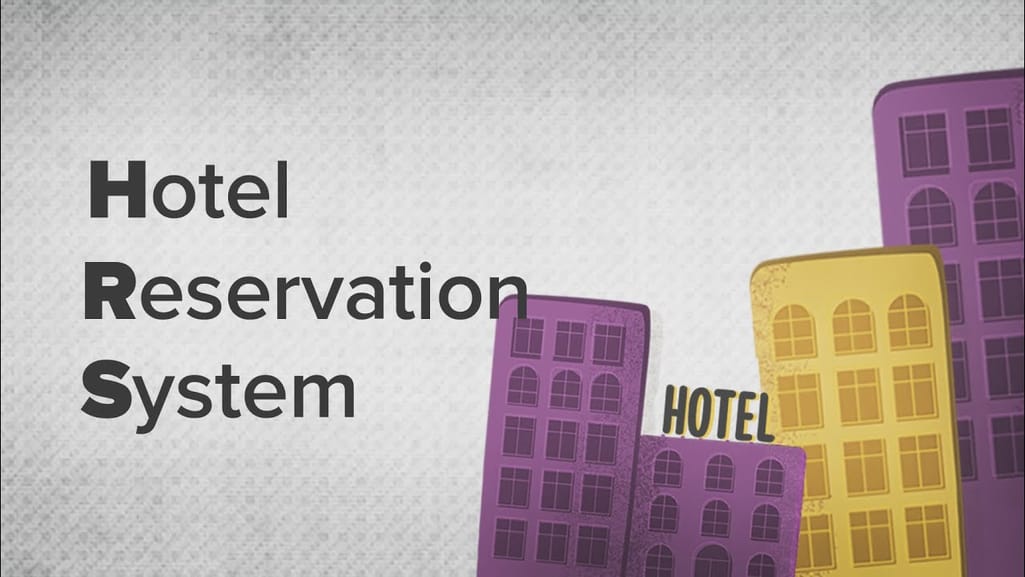

H World Group
H World Group, previously named Huazhu Group, is a prominent global hotel operator based in China.
Brands. H World has 9 brands in its portfolio, including HanTing Hotel, JI Hotel, and Steigenberger Hotels & Resorts.
Properties and rooms. H World operates 10,286 hotels with over 1 million rooms in 18 countries. Only 6.6 percent of its rooms are operated through direct ownership and leasing, while the remaining 93.4 percent are managed under franchise agreements.
Revenue. H World Group's revenue for the second quarter of 2024 was $846 million — an 11.2 percent YoY increase and a 16.5 percent Q/Q increase.
Loyalty program. The H Rewards loyalty program gives members access to exclusive offers, attractive rates, gourmet vouchers, free breakfast, and more across all its hotel brands.
InterContinental Hotels Group (IHG)
InterContinental Hotel Group (IHG) is a prominent British multinational hospitality company headquartered in Windsor, England.
IHG’s origins date back to 1777, when William Bass founded Bass Brewery in Burton-upon-Trent, England. This became one of the largest breweries in the UK. By the mid-20th century, Bass Brewery diversified and entered the hospitality industry by acquiring Mitchells & Butlers—a chain of hotels and pubs—in 1969, the Holiday Inn brand in 1988, and the InterContinental brand in 1998. The rest, as they say, is history.
Brands. IHG has 19 brands covering various segments — luxury & lifestyle, premium, essential, suites, and exclusive partners. Well-known names under IHG’s umbrella include InterContinental Hotels & Resorts, Crowne Plaza, Holiday Inn, and Kimpton Hotels.
Properties and rooms. IHG has 6,430 hotels and 954,000 rooms across 100+ countries, with the largest number (4, 434) located in the Americas — North America, the Caribbean, and Latin America. The second largest market with 1,255 open hotels) is EMEAA — Europe, Middle East, and Africa. Over 4Over 70 percent of IHG hotels are operated under the franchise model.
Revenue. IHG’s first half of 2024 report states that it had a total revenue of $2.322 billion, a 4 percent increase compared to the same period in 2023. The largest share of the revenue comes from the Americas.
Loyalty program. IHG One Rewards provides benefits like a free stay for two kids, dining deals, member-exclusive 10 percent savings on app bookings, and more. There are over 130 million members in the One Rewards program, and IHG's loyalty members spend around 20 percent more than non-members and are ten times more likely to book directly. The loyalty program has grown further in 2024, with loyalty members now accounting for over 60 percent of room nights worldwide.
Best Western Hotels & Resorts
Best Western Hotel and Resort was founded by M.K. Guertin in 1946 in Phoenix, Arizona. What started as an informal referral system among hotel operators in California has become a global hospitality company.
Brands. Best Western has 19 brands in its portfolio, which features Best Western, Best Western Plus, and Best Western Premier. There are also boutique brands like Vib and GLō that target younger, design-conscious travelers.
Properties and rooms. Best Western operates approximately 4,300 hotels and 311 thousand rooms across 100+ countries.
Loyalty program. The Best Western Rewards program gives its members access to perks like exclusive rates, points that never expire, and free nights across all its properties.
Choice Hotels International
Choice Hotels International, based in Maryland, USA, is a global hospitality group founded in 1939. What started when seven motel owners formed a marketing cooperative called Quality Courts United has morphed into the hospitality group we know today.
Brands. Choice Hotels has 22 brands falling into three distinct groups — luxury (Radisson, Ascend), comfortable (Quality Inn, Sleep Inn), and for longer stays (Everyhome Suites.)
Properties and rooms. Choice Hotels operates 7,000 hotels and nearly 570,000 rooms in 40 countries.
Revenue. Choice Hotels achieved total revenues of $435.2 million for the second quarter of 2024 — a 2 percent increase over the same period in 2023.
Loyalty program. The Choice Privileges loyalty program provides rewards like preferred parking, low rates, and gift cards. Members can also redeem points towards cruise trips and travel miles with airline partners like United Airlines and Alaska Airlines.
Learn about the direct booking strategies hotels use to drive direct traffic to their websites and increase sales and revenue.
Impact of hotel groups on the hospitality industry
Over 2 billion people are expected to travel by 2026, and hotel groups will largely influence their experience. These hospitality juggernauts shape market dynamics, set industry standards, and drive innovation in this booming sector. The impact of hotel groups in hospitality is particularly evident in the following areas.
Global economy. The impact of hotel groups extends beyond hotels. The hospitality sector contributes significantly to job creation, stimulates tourism, increases property values, and more. The tourism sector, where hotel groups play a central role, contributed approximately 10 percent to the global GDP in 2022.
Standardization and brand loyalty. One of the defining features of hotel groups is their ability to standardize services and maintain quality across multiple locations. Maintaining consistent service levels across all properties gives hotel groups a competitive advantage, as guests prefer staying at brands they recognize and trust.
Competitive pricing and distribution power. Hotel groups can offer competitive pricing across their brands. Their extensive global networks enable hotel groups to reach a broader audience, ensuring high occupancy rates even in competitive markets. Additionally, loyalty programs like Hilton Honors and Marriott Bonvoy attract millions of members, further reinforcing hotel groups’ competitive position.

With a software engineering background, Nefe demystifies technology-specific topics—such as web development, cloud computing, and data science—for readers of all levels.
Want to write an article for our blog? Read our requirements and guidelines to become a contributor.

